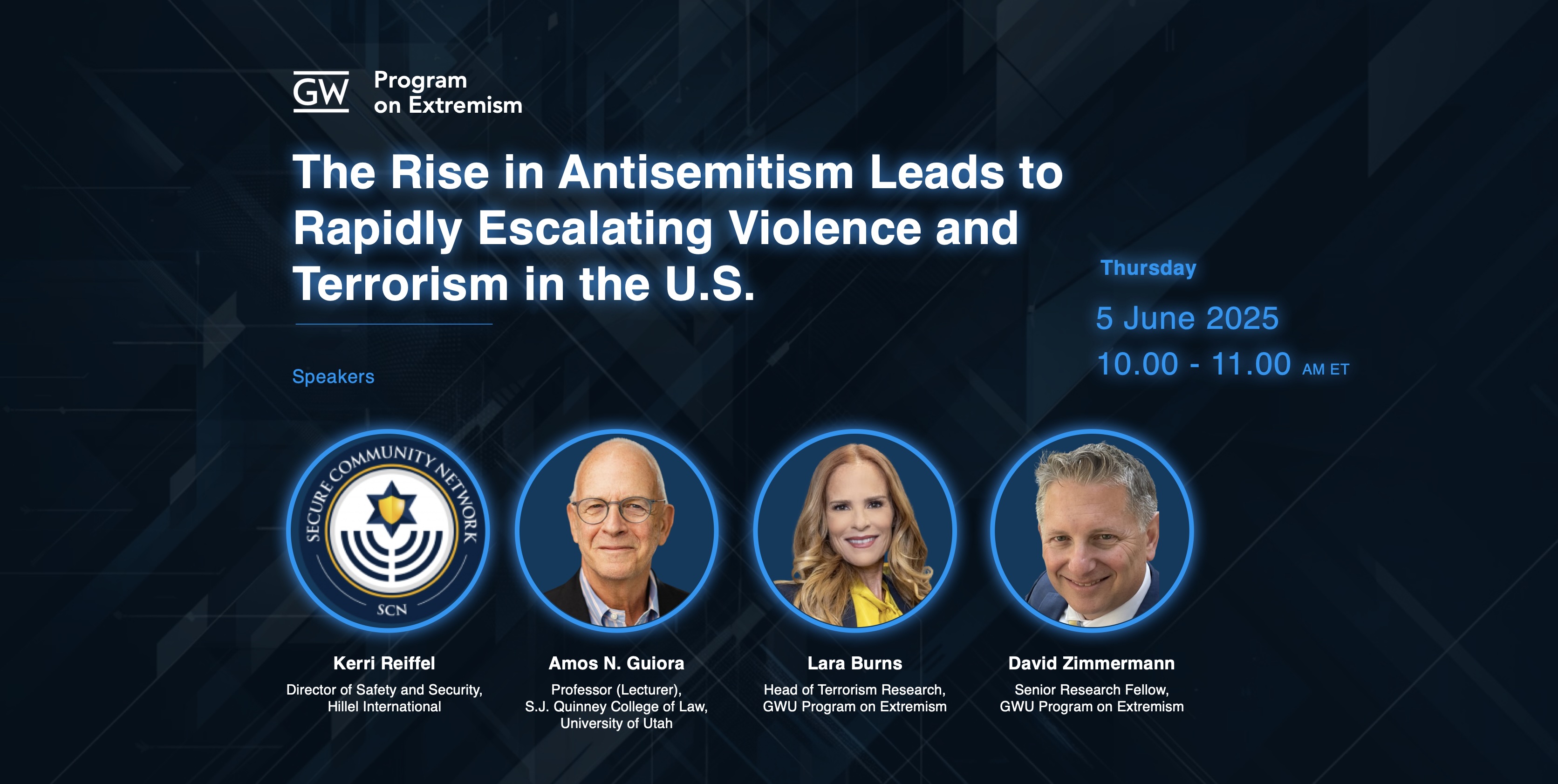The Rise in Antisemitism Leads to Rapidly Escalating Violence and Terrorism in the U.S.

On May 21, 2025, Yaron Lischinsky and Sarah Milgrim were murdered in Washington, D.C by an individual driven by hate and convinced that violence was the solution to a political problem. In the immediate aftermath, social media erupted with debates over whether the attack was motivated by antisemitic beliefs or anti-Israeli sentiment. But would the latter make the tragedy any less horrific? It should not.
Just days later, on June 1, 2025, another hate-filled individual in Boulder, Colorado, threw molotov cocktails at demonstrators, setting innocent people on fire—people who were advocating for the release of hostages held by Hamas.
This escalation of violence comes amid a surge in antisemitic sentiment across the United States and the world, based on a foundation of false narratives and terrorist rhetoric that incite hate and even death.
This panel discussion featured Kerri Reiffel, Director of Safety and Security at Hillel International; Amos Guiora, Professor of Law at the University of Utah; and Lara Burns, Head of Terrorism Research at George Washington University’s Program on Extremism. Together, they examined these tragic events, the rise of antisemitism, and the growing calls for violence against Jewish communities in the U.S. The conversation explored how dangerous rhetoric can lead to acts of terror. The event was moderated by David Zimmermann.
On June 5, 2025, the Program on Extremism (PoE) at The George Washington University hosted a virtual event addressing the recent surge in violent antisemitic extremism in the United States following the October 7 attacks. Moderated by PoE Senior Research Fellow David Zimmerman, the discussion featured three panelists: Kerri Reiffel, Director of Campus safety and security at Secure Community Network; Professor Amos Guiora of the University of Utah; and Lara Burns, PoE’s Head of Terrorism Research.
The conversation opened with a focus on two recent violent attacks in the U.S. — one in Washington, D.C., and one in Boulder, Colorado — both explicitly motivated by antisemitic and pro-Hamas rhetoric. Lara Burns emphasized the perpetrators’ desire for notoriety and martyrdom, noting that both men remained at the scene to be arrested. This, she argued, illustrates a troubling shift in behavior influenced by Hamas’s propaganda model, which glorifies violence and frames attackers as heroes or martyrs.
Burns further explained that the two cases represented a convergence of ideologies: one attacker came from a left-wing background, the other from an Islamist one, yet both echoed pro-Hamas narratives. This overlap underscores the disturbing normalization of extremist rhetoric across ideological lines.
Professor Guiora offered a historical lens, comparing modern antisemitic rhetoric to Nazi propaganda. As the child of Holocaust survivors, he spoke to the enduring power of repeated messaging and criticized platforms like Facebook for enabling the spread of hate speech. Guiora called for legislative reforms to address the new realities of digital extremism.
Kerri Reiffel, drawing on her work in campus safety, discussed the growing intensity of antisemitic activism in higher education. She highlighted a shift from pro-Palestinian sentiment to overt pro-Hamas advocacy, citing examples where students promoted or expressed admiration for Hamas. Reiffel emphasized that many students lack a full understanding of the ideologies they promote and noted that recent campus protests were highly organized, often linked to groups with long-standing ties to Hamas infrastructure.
The panel also explored the legal complexities of hate speech and terrorism. Burns explained that while promoting Hamas propaganda is not always prosecutable under current U.S. law, it can cross into criminal territory if it involves coordination with designated terrorist entities. She underscored the importance of understanding the historical and organizational roots of groups like Students for Justice in Palestine and American Muslims for Palestine.
In closing, the panelists agreed on the central role of education in countering extremism. They advocated for a comprehensive approach that includes student training, law enforcement engagement, public education, and legal reform. Reiffel shared Hillel’s new efforts to empower students through scenario-based safety training, while Guiora emphasized the need to reengage both Jewish communities and broader civil society through honest, fact-based dialogue. He also crucially emphasize the need to educate both students and faculty on the matter.
The event concluded with a unified call to action: to resist the normalization of hate, confront propaganda with truth, and foster a democratic society where ideological differences are addressed through respectful dialogue, based on facts — not violence. As Lara said, “It takes all of us trying to have our voices heard […] Let your voices be heard.”

